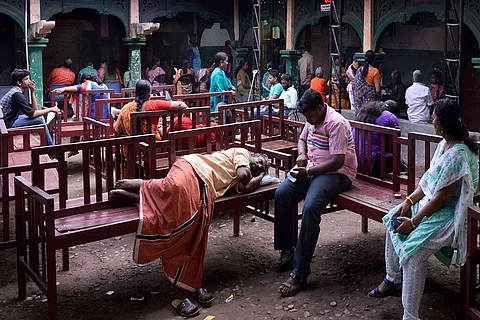

The Kerala government has decided to revoke its decision to discontinue the Karunya Benevolent Fund following outcry over the scheme leaving out nearly two lakh people in the state.
Health Minister KK Shailaja said that the scheme would be continued till March 31, 2020. The government will issue an order to this effect soon.
The government launched the Karunya Arogya Suraksha Paddhathi (KASP) in April aiming to provide free medical treatment up to 40.96 lakh families, with coverage applicable at selected government and private hospitals.
KASP was formed by integrating all healthcare and insurance schemes – the Centre’s Ayushman Bharat-Prime Minister’s Jan Arogya Yojana (AB-PMJAY) and the state’s Karunya Benevolent Fund (KBF). The implementation of KASP has been entrusted with the Comprehensive Health Insurance Agency of Kerala (CHIAK).
Due to this, the KBF – the state government’s scheme for providing financial assistance for poor patients affected with diseases like cancer, kidney failure, heart diseases, haemophilia etc – was to be discontinued. The money for KBF used to be raised from the sale of the government-run Karunya lottery, while for KASP the revenue would be raised from the sale of all government-run lotteries, amounting to nearly Rs 900 crore.
But a row was recently kicked up over KASP not including all those who had been covered under KBF.
“The excluded, around two lakh people, are the outpatients who suffer from serious illnesses and need quick assistance, but do not need to get admitted. In the new scheme, the outpatients won’t get these benefits, that is a huge setback for people who would need to spend just a day in hospitals for chemotherapy and similar procedures,” a source said.
Also, under KBF the procedure to get assistance was easier, patients could apply for assistance with a BPL ration card and the medical certificate. A patient who had the KBF registration card could easily get a prescription from a doctor for medicines that could be bought free of cost from a Karunya Pharmacy. However, KASP is yet to be implemented smoothly.
The State Human Rights Commission had also sought an explanation from the government for scrapping the scheme.
KASP was announced in the 2018 budget of the LDF government while KBF was introduced by the previous UDF government in its 2011-2012 budget.
“In the central government’s Ayushman Bharat Yojana launched in 2018, not all people below the poverty line would come under its coverage as the Centre’s definition for BPL is different from that of Kerala’s. KASP was actually introduced to widen the coverage,” the source added.
More than 19.5 lakh families have enrolled in KASP till the middle of June and the number of patients registered in hospitals is 1,59,649.
KASP offers an annual coverage of Rs 5 lakh for each member of the family as per requirement, while KBF offered a maximum coverage of Rs 3 lakh for an entire family that is below the poverty line. The assistance of Rs 3 lakh was given per ration card – that implies only one time assistance for the whole family.